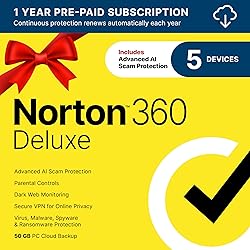Why Antivirus Is Critical for Parents of Teenagers
As teenagers spend more time online for learning, socializing, and entertainment, protecting their digital lives becomes increasingly crucial—making antivirus critical for parents of teenagers. In today’s digital landscape, where cyber threats constantly evolve, proactive security measures are no longer optional. Understanding how antivirus solutions safeguard teenagers helps parents foster a safer online environment while encouraging healthy digital habits at home.
The Unique Cybersecurity Risks Teenagers Face
Teenagers’ Increased Online Exposure
Modern teenagers are digital natives, with access to smartphones, tablets, computers, gaming platforms, and social media. Each new device and platform amplifies their exposure to online risks such as malware, phishing scams, and inappropriate content. Many teens may not always recognize harmful links, risky downloads, or fake messages, making them prime targets for cybercriminals.
The Social Media Factor
Social platforms like Instagram, TikTok, Snapchat, and Discord are central to teens’ social lives. These platforms are rife with phishing attempts, malicious ads, and harmful downloads. Teenagers may be tricked into clicking on suspicious links or participating in viral challenges that hide malware, compromising their devices and personal information.
Mistaken Downloads and Piracy
Teens seeking free games, music, or software may unintentionally download pirated content bundled with dangerous malware. Even teachers and schools warn about the risks associated with “cracked” files or unofficial downloads, which can install spyware or ransomware on personal devices.
How Antivirus Protects Teenagers and Families
Real-Time Threat Detection
A robust antivirus solution operates quietly in the background, monitoring teenage activity for suspicious behavior. It detects threats such as viruses, spyware, ransomware, and trojans in real-time—stopping them before they can do harm. Effective antivirus shields against both known and emerging malware, providing timely alerts for parents and teens.
Blocking Unsafe Websites & Downloads
Many modern antivirus packages include web protection features that block access to malicious websites, phishing pages, and dangerous downloads. This reduces the likelihood of teens falling victim to scams or accidentally installing malware through pop-ups or fake download buttons.
Email & Messaging Protection
Cybercriminals commonly use phishing emails and direct messages to lure unsuspecting teens. Good antivirus solutions scan incoming emails and attachments, preventing teens from opening harmful files or being tricked into sharing sensitive information.
Parental Control Integration
Top-tier antivirus software often includes parental controls, enabling parents to monitor, restrict, or manage teenagers’ online activities. Features may include website filtering, screen time management, and alerts about risky behavior, empowering parents to guide their teens’ digital journeys.
Practical Strategies for Parents: Layering Antivirus with Cybersecurity Education
Open Communication and Digital Literacy
Antivirus tools are powerful, but communication is equally important. Parents should talk to teenagers about online risks, encouraging them to ask questions before downloading new apps or clicking on links—emphasizing that no digital tool is foolproof.
Regular Updates and Best Practices
Keeping antivirus software up-to-date ensures it can defend against the latest threats. Encourage teens to accept updates and avoid turning off real-time protection. Enable automatic updates where possible, and routinely run full system scans.
Device-Wide Coverage
Don’t limit protection to just the family computer. Install antivirus on all devices teens use, including smartphones and tablets. Many antivirus providers offer multi-device packages for comprehensive coverage.
Password Safety and Two-Factor Authentication
While not a direct antivirus function, strong password habits and two-factor authentication add extra layers of defense. Many antivirus products now include password managers to help teens keep credentials secure.
Choosing the Right Antivirus: What Parents Should Look For
Essential Features for Teenagers’ Devices
– User-friendly interface: Easy enough for teens to understand, robust enough for parental oversight.
– Multi-layered protection: Guards against viruses, phishing, ransomware, and spyware.
– Parental controls: Customizable for age-appropriate internet use.
– Cross-platform support: Protects phones, tablets, Windows, and Mac computers.
– Low system impact: Won’t slow down devices or interfere with school or play.
Popular Antivirus Options for Families
While there are many excellent products available, look for reputable brands like Norton, Bitdefender, Kaspersky, or Trend Micro—all of which offer family-friendly features and reliable threat protection.
Frequently Asked Questions (FAQs)
1. Do teenagers really need antivirus on their smartphones?
Yes, smartphones are just as vulnerable as computers. Teens often download apps, use public Wi-Fi, and browse social media—making mobile antivirus essential.
2. Can antivirus block all online threats my teenager may face?
No solution is 100% effective. Antivirus greatly reduces risk, but must be paired with smart online habits and regular updates.
3. How do parental controls in antivirus software help parents?
They enable parents to monitor web activity, restrict harmful content, set screen time limits, and receive alerts on risky actions.
4. What happens if my teenager accidentally disables antivirus protection?
Most antivirus software notifies users if it’s disabled and encourages reactivation. Set up alerts for deactivation and explain to teens why protection is important.
5. Are free antivirus products good enough for teenage users?
Free options can offer basic protection, but premium versions provide better multi-layered defense and parental management features.
6. How can parents talk to teens about downloading risky files or apps?
Open dialogue is important. Discuss examples of cyber-attacks, explain the risks, and agree on guidelines for downloads and app installs.
Summary and Expert Advice
Digital safety is a family priority, especially as teenagers spend more time online for school and socializing. Antivirus is critical for parents of teenagers because it acts as a digital shield, blocking malware, unsafe websites, and cyber-attacks while empowering parents to monitor risk. However, technology alone isn’t enough—ongoing communication and education are vital to fostering responsible digital citizens at home.
Practical Takeaway:
Install reputable antivirus protection on all your teenager’s devices, keep security tools updated, and make digital safety a regular conversation. This layered approach is the best defense against evolving cyber threats—and a crucial step in keeping your family secure online.

